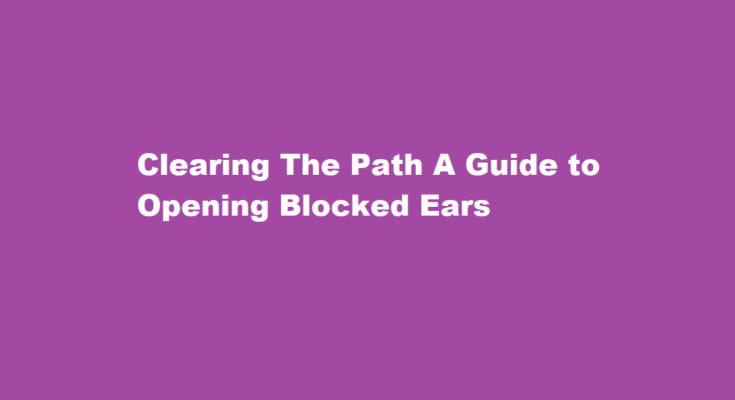Introduction
Having a blocked ear can be an uncomfortable and frustrating experience. It can impair your hearing, cause discomfort, and even lead to dizziness or pain. However, there are various effective methods to open a blocked ear, ranging from simple home remedies to seeking professional help. In this article, we’ll explore some of these techniques, ensuring you’re well-equipped to tackle this common issue.
Understanding Blocked Ears
Before diving into solutions, it’s important to understand why ears get blocked. Blocked ears often occur due to a buildup of earwax, fluid retention, allergies, sinus congestion, or changes in atmospheric pressure. When the Eustachian tube, a small passage connecting the middle ear to the back of the throat, becomes blocked, it can lead to a feeling of fullness and muffled hearing.
Home Remedies
- Warm Compress – A warm compress can help alleviate congestion in the Eustachian tube. Simply soak a clean cloth in warm water, wring out excess water, and place it against the blocked ear for around 5-10 minutes. The warmth can help soften earwax and promote better drainage.
- Saline Solution – A homemade saline solution can work wonders. Mix a teaspoon of salt in a cup of warm water until dissolved. Use a dropper to put a few drops of the solution in the affected ear, allowing it to sit for a few minutes before draining.
- Chewing Gum – Chewing gum can help regulate pressure changes, particularly during flights or when experiencing changes in altitude. The act of chewing promotes the opening of the Eustachian tube, thus relieving the blocked sensation.
Over-the-Counter Solutions
- Ear Drops – Non-prescription ear drops can aid in softening earwax and facilitating its natural expulsion. It’s essential to follow the instructions on the product and consult a healthcare professional if the problem persists.
- Decongestants – Over-the-counter decongestant nasal sprays or pills can help relieve nasal congestion, indirectly aiding in opening blocked ears caused by sinus issues. Consult a pharmacist or doctor before using any medication.
Professional Interventions
- Ear Irrigation – In cases of stubborn earwax buildup, a doctor may perform ear irrigation. This involves using a syringe to gently flush warm water into the ear canal, dislodging and washing out excess wax.
- Manual Ear Cleaning – A medical professional can use specialized tools to carefully remove stubborn earwax or debris. It’s crucial to avoid attempting this at home, as improper methods can lead to ear canal injuries.
- Pressure Equalization – If blocked ears are related to changes in atmospheric pressure, as experienced during air travel, techniques like the Toynbee maneuver (swallowing while pinching the nose) or the Valsalva maneuver (gently blowing while pinching the nose) can help equalize pressure in the middle ear.
Preventive Measures
- Maintain Ear Hygiene – Regularly clean the outer ear with a damp cloth to prevent excessive wax buildup. Remember, the ear canal is self-cleaning, so avoid inserting objects like cotton swabs.
- Stay Hydrated – Drinking an adequate amount of water can help maintain the thin consistency of mucus and prevent congestion.
- Avoid Loud Noises – Prolonged exposure to loud noises can lead to fluid retention and pressure changes in the ears. Use ear protection in noisy environments.
- Frequently Asked Questions
How do doctors fix a blocked ear?
Your health care provider can remove excess wax by using a small, curved tool called a curet or by using suction techniques. Your provider can also flush out the wax using a syringe filled with warm water and saline or diluted hydrogen peroxide.
How do you unblock a seriously blocked ear?
The Valsalva Maneuver — This is a fancy name for popping your ears. Plug your nose, take a deep breath through your mouth, close your lips, puff your cheeks and exhale gently through your nose. The pressure that is created helps unclog your ears. Chewing gum afterwards will help keep your eustachian tube open.
Conclusion
While a blocked ear can be bothersome, the good news is that there are numerous effective methods to open it up and restore your hearing. From simple home remedies to seeking professional assistance, you now have a range of options to choose from. Remember, if your symptoms persist, it’s best to consult a medical professional to determine the underlying cause and receive appropriate treatment. By taking care of your ears and understanding how to manage blockages, you can ensure your auditory health and overall well-being.
Read Also : Navigating The Social Stream Overcoming Instagram Addiction



